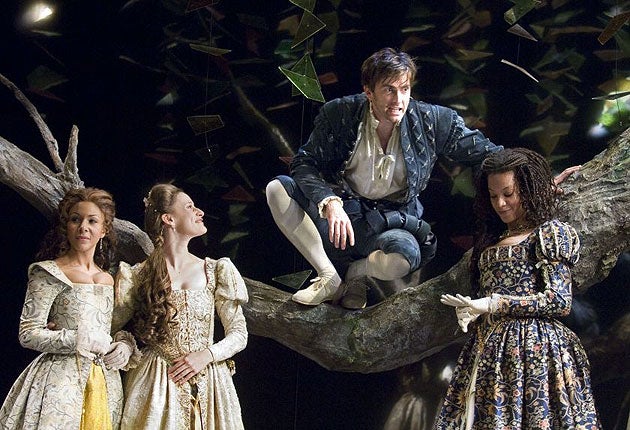First Night: Love's Labour's Lost, Stratford-upon-Avon
Tennant's labours not lost on Bard lovers

Jonathan Miller notoriously dismissed David Tennant as "the man from Doctor Who" and virtually accused the RSC of selling out to fame when they hired him to play Hamlet.
Miller was left looking foolish on several counts. Tennant's triumphant performance was (and still is) a reminder that this Dr Who is a classically trained actor with two previous seasons in Stratford under his belt. It also exposed the snobbery of supposing that fans of Doctor Who aren't the sort who could ever become fans of Shakespeare.
That fallacy seems even dafter in the light of this latest Tennant-related project – a high-spirited, thoughtful production of Love's Labour's Lost directed with fizz and finesse by Greg Doran. This historically earlier play is a delight, but linguistically it is one of the trickiest of the Bard's comic works.
Wonderfully funny at the fleet-footed wit, the physical clowning and the moments of real intellectual depth, Tennant portrays Berowne, one of the three young lords who, with the King, take an oath that they will spend three years in study, while foreswearing the company of the opposite sex. Such high-minded abstinence is, of course, entirely against the spirit of comedy, and comeuppance arrives in the shape of the French princess and her ladies.
There's been a fashion lately of updating the piece in a way that betrays fundamental distrust of it – the nadir being a recent version that relocated it in a corporate City bank (making nonsense of the vows and just about everything else). Doran pays it the compliment of presenting it in the Elizabethan period on a mirrored set dominated by a huge tree festooned with dangling, leaf-coloured glass.
Berowne is both the least self-deceived of the lords and the sharpest. Tennant uses his native Scots accent, and there's a natural healthy scepticism in its lilt that suits the role. The character's comparative non-conformity is also signalled here by the fact that his pewter-blue costume is in vivid contrast to the prevailing white-and-gold.
The production is a banquet of choice comic acting. Ricky Champ brings a touch of Norman Wisdom to that least wise of clowns, Costard, while Joe Dixon is hilarious as the English-mangling Spanish braggart Don Armado ("Men of piss, well encountered").
Music is also beautifully used. In the scene where each lord, deludedly believing himself to be unobserved, confesses his love to the audience, the foursome end up harmonising in song. And the production segues with terrific poise from the farce of the Nine Worthies pageant to the shock of death that lays its chill on the fifth act.
It's wonderful to think that, by virtue of his role in the Tardis, Tennant is able to square the circle for the RSC. Without diluting the expertise and the sense of seasoned experience a jot, he is awakening newcomers to the wonders of Shakespeare at his most exuberant.
Join our commenting forum
Join thought-provoking conversations, follow other Independent readers and see their replies
Comments